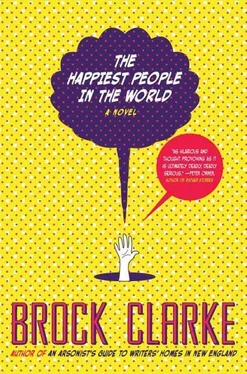The imam blinked once, twice. He smiled sadly at the computer screen. “Maybe you’re right,” he said. He leaned forward, into the screen, reached out his right arm, and then disappeared.
The next morning, Søren stopped at the gas station near Gammel Skagen, on the way south out of town.
Gas stations were the worst, in Søren’s opinion. A guy with Søren’s skin color could go into a supermarket in Skagen to buy a loaf of bread without being especially scrutinized. But the minute you tried to buy something potentially explosive or flammable, you were suddenly terrorist material.
But then again. .
Anyway, he went inside to prepay. At the counter, there was an American in front of him. Søren had seen only a few Americans in Skagen — they didn’t seem to ever make it this far north — but he’d seen lots of them on TV. The Americans on TV talked basically like an exaggerated version of the way this woman talked, and both were less refined versions of the way Søren himself had been taught to speak English in school. The woman wore a baseball hat, with a big white letter C against a bright red backdrop.
“No, I don’t need a PIN,” she was saying to the clerk, who was holding the American’s credit card.
The clerk just shrugged. His head was somewhat like the American’s hat. His hair and eyebrows were so blond they were almost white, and his face was ruddy. He swiped the card, then swiveled the card reader so that the American could read it. “It says to please enter your PIN, please,” he said in English.
“But I don’t have that,” the American said. It seemed to Søren like she was trying not to cry. She took off her baseball hat, mussed her black hair, and then put the hat back on. Meanwhile the clerk smiled. The smile seemed genuine; the smiler, imperturbable. Everything about him, his hair, his eyes, his soul, communicated, Don’t worry, we’ll figure this out. “I bet you can just push a button or something so I don’t need one.”
“You don’t need one what?”
“A PIN,” the American said. “P-I-N.”
“Yes,” the agreeable clerk said. “That spells PIN. That is what you need.”
The American looked down at the machine. She hit four numbers in a hurry, not even seeming to try to guess what might be the right ones, just getting it over with. The machine made known its displeasure. And the American then reached into her purse, pulled out a bunch of kroner, gave the cash to the clerk, and then retreated to her automobile.
Then it was Søren’s turn. He smiled in comradely fashion at the clerk, who was busy counting the kroner and then putting each bill in with its denominational kin. When he was done, the clerk smiled at Søren until he lifted his head and actually saw Søren. Not that he then stopped smiling. But the smile changed. It was the way that white Danes tended to smile at Søren: with equal parts accusation and apology. He turned the machine in Søren’s direction. Søren swiped his card, entered the PIN. The machine beeped in affirmation. But still, the clerk then asked to see Søren’s credit card, and also his driver’s license, all the while still smiling that smile, which said, I am truly sorry, I recognize you’re a human being, and a Danish citizen, just like me, except that I am a Danish citizen who doesn’t get asked to show my driver’s license when buying gasoline, but then again, I’m not a religious extremist who has used gasoline to blow up or burn up people, places, and things, but then again, you probably haven’t, either, odds are very strong that you’ve also not committed arson or murder, and what a shame it is that I’m even for a moment thinking of you as someone who has committed arson and murder, it’s actually worse than a shame that I’m thinking of you in that way, it’s actually a crime, but not a crime like arson and murder are crimes, I think we can all come to an agreement on that topic, and I think we can also all agree that this is a great, civilized, open-minded country, and that is why you came here, or your parents came here, because it’s such a great, civilized, open-minded country, and I’m sincerely glad, we’re all sincerely glad, that you came here, because just by your mere presence you’re confirming our sense that it is a great, civilized, open-minded country, or at least it was until you people started with your burning and killing and basically making it a little less great, a little less civilized, a little less open minded, but hey, I see from your credit card and driver’s license that your name is Søren, how funny, good for you, here’s your receipt, Søren, have a great day, drive safely, don’t forget that we’ll probably be watching you.
Or maybe that was just the guilt talking. Søren couldn’t be sure. That was why he had to go confess to the widow. Murder, murder, he reminded himself. Blood, blood.
Søren took his receipt and exited the building. On the way to his car he passed the American, who was still filling her car, and also talking on her cell phone.
“You said I didn’t need a PIN,” she was saying. “Well, if it wasn’t you, it was someone like you .” The second time she said “you,” she was looking directly at Søren as he walked by.
The cartoonist’s widow’s house in Aarhus wasn’t as pretty as the one Søren had burned down in Skagen. It wasn’t even in Aarhus proper, but rather just outside the city; it looked pretty much the same as any place just outside any city in northern Europe. It was a two-story box among other two-story boxes — sleek, metallic, energy efficient, soul deficient, with lots of louvered windows that wouldn’t even open far enough for you to jump out of them, if there happened to be a fire.
Am I really going to do this? thought Søren, and then he rang the bell before he could think it again. He heard footsteps from within. The door opened. A very pretty woman — white-blond hair, slender, attractive squinty sun lines in the corners of her pale blue eyes — appeared in the doorway. She was wearing workout clothes — black tights that ended just above the ankle, and a tight-fitting bright blue warm-up jacket — although she was also wearing clogs. These were clothes meant to communicate, I’m just hanging out, being myself, being comfortable, but also only a quick change in footwear away from launching into a really strenuous cardiovascular workout. “Hi, hi,” she said, without noticing it was Søren standing there. But when she saw it was Søren, her eyes went wide. Søren recognized the look. It was the look white Danes sometimes had when Danes who were also probably Muslims knocked on their door. But with Ilsa, Søren guessed, even more so.
“Ilsa?” Søren asked, although he knew it was she. He’d seen a picture of her on the Internet. It was a picture taken by a newspaper, directly after he’d killed her husband. In the picture she looked so sad, so horrified, and she looked that way now, too. What have I done? was what Søren had thought when he’d seen the picture, and he thought it now, also. Nothing had changed: Ilsa was still a widow, Søren a murderer; Ilsa was still sad, Søren was still guilty. Things had to change. This was another reason he had to confess. No matter the consequences, which, honestly, were so overwhelming and awful that Søren hadn’t really allowed himself to consider them. “Ilsa Baedrup?” he said.
“Oh no,” Ilsa said. She took a step back into the house, and Søren took a step closer.
“Please forgive me,” Søren said, and he was about to explain for what when Ilsa blurted out, “I don’t know where Jens is! I promise!”
“What’s that?” Søren said. But Ilsa had already slammed the door shut. He could hear the lock click and then a bolt thunk into place. “What are you talking about?” Søren said. “Jens is dead .” Ilsa didn’t say anything, but she didn’t need to: she’d said enough already, enough to make Søren feel as if he could finally think . For four years it had been as though there’d been a door in Søren’s head constantly banging shut and then opening, making too much noise, letting things in that he wanted out. But now, a bolt thunked into place in his head, too. The cartoonist is not dead, he thought. I did not kill the cartoonist. I did not kill anyone at all. I am not a murderer. That made him so happy, but then he also thought: Four years, four years, I’ve wasted four years thinking I was a murderer. And that made him so angry that suddenly he really did want to kill someone. Søren started banging on the door. “He’s supposed to be dead,” he yelled.
Читать дальше












